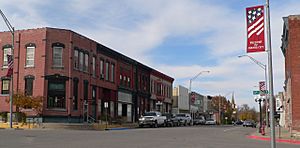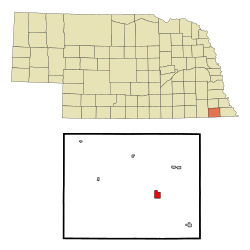Pawnee City, Nebraska facts for kids
Quick facts for kids
Pawnee City, Nebraska
|
|
|---|---|

West side of G Street, looking NW from 6th St, 2010
|
|

Location of Pawnee City, Nebraska
|
|
| Country | United States |
| State | Nebraska |
| County | Pawnee |
| Incorporated | 1858 |
| Area | |
| • Total | 1.21 sq mi (3.12 km2) |
| • Land | 1.21 sq mi (3.12 km2) |
| • Water | 0.00 sq mi (0.00 km2) |
| Elevation | 1,198 ft (365 m) |
| Population
(2020)
|
|
| • Total | 865 |
| • Density | 717.84/sq mi (277.20/km2) |
| Time zone | UTC-6 (Central (CST)) |
| • Summer (DST) | UTC-5 (CDT) |
| ZIP code |
68420
|
| Area code(s) | 402 |
| FIPS code | 31-38575 |
| GNIS feature ID | 2396164 |
| Website | pawneecity.com |
Pawnee City is a small city located in Pawnee County, Nebraska, in the United States. It is the main town, also known as the county seat, for Pawnee County. This means it's where the county government offices are. In 2010, about 878 people lived there.
Contents
History of Pawnee City
The area where Pawnee City now stands was chosen as the county seat on November 4, 1856. The town was officially planned in the spring of 1857. Pawnee City became an incorporated city in 1858. It was named after the Pawnee Native Americans, who were the original inhabitants of the region.
By the 1880s, Pawnee City became an important railroad town. It was a place where two different railroad lines met. On August 9, 1881, a big fire destroyed about two-thirds of the downtown area. After the fire, the town was rebuilt using materials that were more resistant to fire.
Geography and Location
Pawnee City is located in Nebraska. According to the United States Census Bureau, the city covers a total area of about 1.21 square miles (3.12 square kilometers). All of this area is land, with no large bodies of water inside the city limits.
Population Changes Over Time
| Historical population | |||
|---|---|---|---|
| Census | Pop. | %± | |
| 1880 | 763 | — | |
| 1890 | 1,550 | 103.1% | |
| 1900 | 1,969 | 27.0% | |
| 1910 | 1,610 | −18.2% | |
| 1920 | 1,595 | −0.9% | |
| 1930 | 1,573 | −1.4% | |
| 1940 | 1,647 | 4.7% | |
| 1950 | 1,606 | −2.5% | |
| 1960 | 1,343 | −16.4% | |
| 1970 | 1,267 | −5.7% | |
| 1980 | 1,156 | −8.8% | |
| 1990 | 1,008 | −12.8% | |
| 2000 | 1,033 | 2.5% | |
| 2010 | 878 | −15.0% | |
| 2020 | 865 | −1.5% | |
| U.S. Decennial Census | |||
The population of Pawnee City has changed quite a bit over the years. It grew a lot in the late 1800s, reaching almost 2,000 people by 1900. Since then, the population has slowly decreased. In 2020, the city had 865 residents.
Who Lives in Pawnee City?
Based on the 2010 census, there were 878 people living in Pawnee City. Most of the people living in the city were White (96.9%). A small number of residents were from other racial backgrounds or identified with two or more races. About 2.1% of the population was Hispanic or Latino.
The average age of people in Pawnee City in 2010 was about 52.9 years old. This means it's a community with many older adults. About 18.7% of residents were under 18, and 31.8% were 65 or older.
Famous People from Pawnee City
Pawnee City has been home to several notable individuals who have achieved success in various fields.
- Daniel Atkinson (1921–2024) was a well-known biochemist who worked at UCLA. Biochemists study the chemical processes that happen inside living things.
- David Butler was an important political figure. He served as the very first governor of Nebraska from 1867 to 1871.
- Lavon Heidemann also became a political leader, serving as the lieutenant governor of Nebraska.
- Larry the Cable Guy is a famous comedian, known for his unique style of humor.
- Irish McCalla was an actress, known for her roles in movies and television.
- Kenneth S. Wherry was a local leader who became the mayor of Pawnee City. He later served as a U.S. Senator for Nebraska from 1943 to 1951, and even became the Senate Republican Leader.
See also
 In Spanish: Pawnee City para niños
In Spanish: Pawnee City para niños

